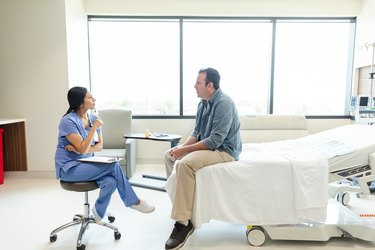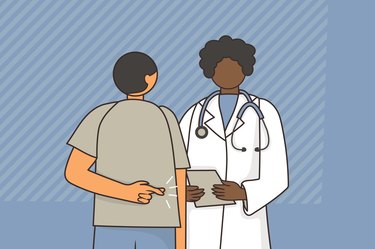
No matter if you eat nutritious foods or work out consistently, it's still important to take care of your health in other ways, like going to the doctor for a routine physical.
During a physical exam, doctors get more insight into how your body's working and can screen for certain health risks. These regular checkups are a great preventive tool and an important part of your wellbeing.
Video of the Day
Video of the Day
That said, certain things you do before your physical can affect your experience. For example, some foods and drinks can temporarily alter your blood work, causing your doctor to assume you have a health issue when you don't.
To avoid any potential misunderstanding, here's what not to do before a physical exam, according to doctors.
First, What Happens at a Physical?
While every doctor does physical exams a little differently, there are some common things a patient can expect during any physical, says Sujay Pathak, MD, an assistant professor at Johns Hopkins University School of Medicine. These include:
- General questions about personal and family health history, often collected in a pre-visit form
- Discussion about your habits and self-care, like how much exercise and sleep you get, or what you eat on a regular basis
- Questions about specific health risks, like your use of alcohol, cigarettes and drugs, or your sexual history
- A physical exam: "The 'physical' part of the physical exam typically follows a strict pattern," says William Li, MD, author of Eat to Beat Your Diet: Burn Fat, Heal Your Metabolism, and Live Longer. "Doctors first check your head, eyes, ears, nose and throat. Then, your lungs, heart and abdomen, [followed by] your muscles, reflexes, nervous system and skin." Sometimes, the doctor will perform a prostate or cervical exam as well.
- Basic blood work to check cholesterol, electrolytes, liver and kidney functions, and screen for sexually transmitted diseases. You might have your blood drawn at the appointment or your doctor may order these tests to be done at another time, sometimes at an offsite lab.
- Shots and screenings (sometimes): "Depending on a patient's age, cancer screenings or vaccines may be suggested, too," Dr. Pathak says.
If you come to your exam with any specific concerns or signs of a certain medical issue, your doctor may request a more detailed exam focused on those things, Dr. Li says.
Additionally, certain factors like time constraints and insurance issues may also cause your doctor to schedule a follow-up appointment, Dr. Pathak says.
How Often Should You Get a Physical?
While an annual physical is standard for many people, you might need less frequent exams if you're in good health.
“Talk to your doctor about how often you need to be seen for checkups,” Dr. Pathak says. “If you're a young, healthy patient, your doctor might say a visit every two to three years is perfectly adequate.”
What Not to Do Before a Physical
1. Eat a Meal High in Sugar, Salt or Fat
If you're going to have your blood drawn at your exam, you'll want to watch what you eat beforehand. (If you're not sure whether your physical will include blood work, call your doctor's office and ask.)
What you eat before a blood test can affect your blood glucose, cholesterol and triglyceride levels, according to University Hospitals.
"A high-sugar, high-salt or high-fat meal before a physical can cause a patient's blood pressure, blood sugar or blood lipid tests to be temporarily abnormal," Dr. Pathak says. "This might make it look like the patient has diseases that they don't really have."
For this reason, most doctors recommend you start fasting the night before your physical, Dr. Li says.
Dr. Pathak agrees: "It's best to avoid eating for eight to 12 hours prior to getting blood work to ensure an accurate result." This will give your body enough time to fully absorb and digest food.
Ideally, you'd schedule your physical and blood work for early in the morning — say, 8 a.m. — so you can simply stop eating after dinner and delay breakfast until after your appointment.
Tip
Prescription medications, vitamins and supplements may also affect the accuracy of your blood tests, according to University Hospitals, so make sure your doctor knows if you're taking any of these (and don't stop taking any prescription meds unless your doctor advises it).
2. Drink Too Little or Too Much Water
Being dehydrated may possibly influence your blood test results, Dr. Li says.
"When patients get blood work in a dehydrated state, it can falsely raise concerns about their kidney function," Dr. Pathak says. "But, drinking too much water can also cause electrolyte problems," he adds.
For good health, and an accurate blood test, Dr. Pathak advises drinking between six to eight glasses of water per day.
Staying hydrated may also make drawing your blood easier. Water keeps your veins hydrated (i.e., it "plumps" them up), so drinking more H2O can help the nurse or technician locate them faster, according to University Hospitals.
3. Drink Alcohol
"Alcohol on the night or day before a physical can elevate blood pressure or blood sugar, again raising concerns for conditions you may not really have," Dr. Pathak says.
Alcohol can also potentially affect your test results by altering your liver enzymes, according to University Hospitals.
Plus, if you have a horrible hangover or you're under the influence, you're less likely to provide accurate information about your health. "It will make it harder for your doctor to get a good history of your health," Dr. Li says.
And if you're not thinking clearly, you may have a difficult time understanding your doctor, or miss important details about your care.
4. Drink Caffeine
Turns out, the caffeine in your morning cup of joe could cause a jump in your blood pressure.
While the connection between caffeine and raised blood pressure isn't fully understood, there are two possible theories: Caffeine may hinder a hormone that helps widen your arteries, or it may signal your adrenal glands to emit more adrenaline, according to the Mayo Clinic.
Still, every person is different, and the effects of caffeine on blood pressure can vary from person to person. For example, most habitual coffee drinkers are accustomed to the caffeine, so they may only have a slight increase (i.e., one or two points) in their blood pressure, according to Harvard Health Publishing.
If you think your coffee might be spiking your blood pressure, take a baseline blood pressure reading before you drink a cup of coffee and then another one 30 to 120 minutes later. If your reading raises by 5 to 10 points, you may be sensitive to the side effects of caffeine, per the Mayo Clinic.
To reduce the risk of an inaccurate blood pressure reading at your physical, try to avoid caffeine at least two hours before your exam.
While your coffee may affect your blood pressure, it won't likely affect your blood tests. That is, unless, you drink coffee with creamers or sweetener, as they "can throw off your blood work just like a high-sugar or high-fat meal would," Dr. Pathak says.
So if you're planning to get blood work, "try not to add sugar or dairy to your brew," Dr. Li adds.
5. Work Out Right Before Your Appointment
Regular exercise is good for your overall health. But hitting the gym too hard right before your physical isn't a good idea.
"Many of my patients have had their blood work raise concerns of liver problems when the real culprit was heavy weightlifting or very high-intensity cardio in the days prior to their appointments," Dr. Pathak says.
"The enzymes that leak from muscles after a strenuous workout are the same enzymes that leak from damaged livers, but a patient's blood work can't tell the difference," he adds.
What's more, a sweat session right before a fasting blood test may also alter your cholesterol and glucose test results, according to University Hospitals.
In other words, save the HIIT workout or heavy lifting for after your appointment.
6. Come Unprepared to Talk About Your Medical History
Any hospitalizations or medical issues you've dealt with in the past (or since your last visit, especially) can give your doctor a better idea of your current health risks.
"The more information you have about your personal and family history, the better," Dr. Pathak says.
Along with your own medical history, come prepared to discuss the basic health histories of your parents, siblings, grandparents and children, he says. This includes anything that's cropped up since your last appointment.
Still, "don't stress about this," Dr. Li says. Your doctor will appreciate any information you have.
If you tend to get a little nervous at the doctor's office (which is very common), try writing down your health history beforehand. This will make you less likely to forget anything important.
When you're writing things down, here's some info to include, per the National Institute on Aging (NIA):
- Past illnesses, operations and medical conditions
- A list of names of other doctors you've seen in the past or see now
- A list of all your prescription drugs, over-the-counter medicines, vitamins, herbal remedies or supplements and the dose you take
You can also ask to have the medical history form sent to you before your appointment, so you can fill it out without feeling rushed, per the NIA.
7. Skimp on Sleep the Night Before
"A sleepless night could affect your blood pressure, and possibly more importantly, your ability to properly relay your medical history," Dr. Pathak says.
But don't worry if you were tossing and turning the night before. While restful sleep is ideal for a physical, it's not absolutely necessary, he adds.
"Do your best to get a good night's sleep before you come in, but definitely don't cancel the appointment if you can't sleep for some reason," Dr. Pathak says.
Just let your doctor know so they can make a note of it, or help you address it if lack of sleep is a chronic problem for you.
The Bottom Line
Getting a routine physical is an important part of staying healthy. These preventive exams can help identify anything out of the ordinary long before it causes major issues, Dr. Pathak says.
While some habits seem harmless — like working out before your appointment — they can throw off certain test results, he adds.
Another benefit of physicals? Building a better connection with your doctor, Dr. Pathak says. The more familiar your doctor is with your health, the easier it will be for them to spot something that's unusual for you.
Is this an emergency? If you are experiencing serious medical symptoms, please see the National Library of Medicine’s list of signs you need emergency medical attention or call 911.


